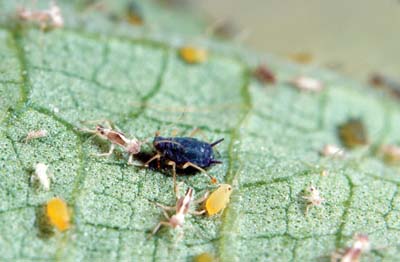To save the Web-optimized images shown below to your hard drive:
|
Click to access Display and Print quality images. |
The melon aphid is a serious pest on watermelons, cucumber, squash, pumpkin, and cantaloupe. Other vegetable crops that are seriously affected are asparagus, pepper, eggplant, and okra. Melon aphids feed on the underside of leaves or on growing tips of vines sucking nutrients from the plant. Infested foliage may become yellowish in color and die. Leaf curling is also a symptom that is caused by melon aphids. Since the melon aphid produces honeydew, sooty mold maybe present that will affect the quality of fruit and the photosynthetic capacity of the plant. The melon aphid may also transmit viruses. Stylet oils may be applied in order to deter transmission of plant viruses. Many natural occurring enemies are known to be effective against melon aphids and may provide sufficient melon aphid control. Insecticides are commonly used but resistance has been noted to many chemicals, and excessive and unnecessary use should be avoided. Cultural control practices that can be used include destruction of infested crops, use of row covers, and early planting dates.
Images
To save the Web-optimized images shown below to your hard drive:

Melon aphid, Aphis gossypii, dark form of wingless adult
and nymphs of mixed ages.
(Photographer: J. Castner, University of Florida)
Click to access Display and Print quality images.
|
|
Click to access Display and Print quality images. |
|
|
Click to access Display and Print quality images. |
|
|
Click to access Display and Print quality images. |
|
|
Click to access Display and Print quality images. |